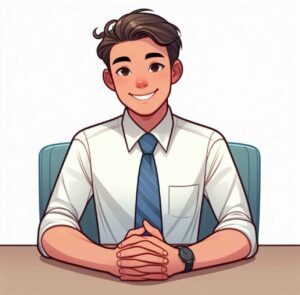Welcome Blessings!
(Tap 🔽 to see more topics!)


Have you ever felt that mix of excitement and nerves right before a big moment? Like standing at the door, knowing something amazing could be on the other side? That’s where you are with this final interview. Getting to this point isn’t just luck… it means they saw something genuinely promising in you – enough to put you in this final group. Think of all the people who applied! You stood out. But now, it’s about making that connection, showing them the real you and why you’d be a fantastic addition to their team.
Yeah, the pressure’s on, right? It’s the last step, the one that counts. But try to flip that feeling. This isn’t just an interrogation but also your chance to show them what makes you tick, what you’re passionate about, and how you’d fit in. To help you nail this, I have seven simple tips that have worked for many people, especially my students. Whether you’re a pro or this is your first big final interview, these ideas are about letting your personality shine and making a real connection.
Master the Art of Storytelling
At this stage in the interview process, you’re no longer just answering questions, you’re telling your story. Think of the final interview like a movie trailer. The employer has already seen a teaser of your qualifications through your resume, but now they want the whole picture. Why does storytelling work? Because we humans are wired to respond to stories. They make our experiences more relatable and memorable. Instead of simply stating your skills and achievements, frame them within a story demonstrating your problem-solving abilities, teamwork, or leadership.

For example, if the interviewer asks about a time you overcame a challenge, don’t just say, “I solved a problem by using my technical skills.” Instead, craft a narrative:
“When I worked at (name of your previous company), we faced a major issue with our product delivery system. The client was unhappy, and we were on the brink of losing their business. I quickly collaborated with the logistics team, identified a gap in communication, and implemented a new process that improved our delivery efficiency by 25%. The client was impressed, and we secured the contract renewal.”
Always relate your story to how it benefited the company or solved a problem. This shows that you’re capable and driven to create value.
Understand the Employer’s Needs Like a Detective
Have you ever heard the saying, “The best way to predict the future is to create it”? Well, this applies to job interviews, too. The final interview is about understanding the employer’s needs and showing them you’re the perfect solution.
Before the interview, you need to do your homework. Think of yourself as a detective gathering clues. Research the company’s goals, challenges, and industry trends. What are they working on right now? What are their pain points? Use this information to tailor your responses and highlight the skills that align with their needs. For example, if you’re interviewing for a marketing role, and you know the company is launching a new product, you can say:
“I understand that you’re rolling out a new product this quarter, and my experience leading digital campaigns for similar product launches could help boost brand awareness and drive sales from day one.
By doing this, you’re showing that you’re not just any candidate but you’re the candidate who understands their business and is ready to step in and make a difference from the start.
Showcase Emotional Intelligence (EQ)
In the final stages of the interview process, employers aren’t just looking for technical skills, they want to see if you’ll fit into the company culture and how you’ll handle real-world situations with colleagues, clients, and superiors. That’s where emotional intelligence (EQ) comes into play.
Strong EQ means handling difficult conversations, managing stress effectively, and understanding how your actions impact others. It’s like having a social superpower! Guess what? Employers love it. Weave examples demonstrating your self-awareness, empathy, and relationship management skills during your final interview. You can talk about how you’ve handled conflict in a team, how you stay calm under pressure, or how you motivate others. For instance, if the interviewer asks how you handle stressful deadlines, you could say:
“In tight deadlines, I always stay calm, prioritize tasks, and communicate with my team to ensure we’re all aligned. I’ve found that transparency and empathy help manage stress and keep everyone on track.”
Being able to showcase your emotional intelligence not only sets you apart from other candidates but also signals to employers that you can thrive in any workplace environment.

Prepare for Behavioral Interview Questions
Behavioral interview questions are a staple in final interviews because they help employers understand your performance in real-world scenarios. These questions often begin with, “Tell me about a time when…” or “Give me an example of…” They’re designed to assess your past behavior to predict future performance.
The best way to prepare for these questions is to use the STAR method, which stands for Situation, Task, Action, and Result. This simple framework will help you organize your thoughts and ensure you provide comprehensive and precise answers.
For example:
“Tell me about a time you had to manage a difficult project.”
Using the STAR method, your answer could look like this:
“In my previous role as a project manager, we delivered a product on a tight deadline. The team was facing delays due to unforeseen technical issues. I organized daily check-ins to monitor progress, reallocated resources and motivated the team by offering incentives. As a result, we completed the project on time and received positive feedback from the client.”
This method helps you stay focused and gives interviewers a clear picture of your abilities.
Ask Insightful Questions
One of the candidates’ biggest mistakes during the final interview was not asking questions. Remember, this is a two-way conversation. It is your chance to gauge whether the company fits you and show you’re invested in the role. Ask insightful questions beyond the basic “What’s the culture like?” or “What are the benefits?” These questions should reflect that you’ve researched and are genuinely interested in how you’ll fit into the team. Some great questions to ask include:
By asking thoughtful questions, you demonstrate your strategic thinking, eagerness to contribute, and genuine interest in the company’s long-term success.
Show Confidence, Not Arrogance
Confidence is key in any interview, especially during the final round. However, there’s a fine line between confidence and arrogance and you’ll want to ensure you stay on the right side. Being confident means expressing your skills and experiences clearly without downplaying your accomplishments. It’s about demonstrating that you believe in your abilities without sounding boastful. For instance, instead of saying, “I’m the best candidate for the job,” try:
“I’m confident that my skills in ___ and _____ and my passion for _____ make me a strong fit for this position. I’m excited about the opportunity to contribute to your team.”
Remember, humility goes a long way. Show gratitude for the opportunity and be respectful to everyone you meet during the interview process.
Follow Up with a Strong Thank-You Note
Lastly, don’t forget to send a thank-you note after the interview. This is your final chance to make a positive impression, and it can help keep you top-of-mind for the hiring manager. Your thank-you note should be personalized, and express gratitude for the opportunity to interview. It’s also a great place to reiterate why you’re excited about the role and how you can contribute to the company’s success.
Example:
“Dear (Interviewer’s Name),
Thank you so much for taking the time to meet with me today. I enjoyed learning about (Company Name) and the exciting work in the (specific department/team). I’m confident that my experience in (related skill or project) aligns well with your team’s goals, and I’m eager to contribute. Please don’t hesitate to reach out if you need any further information.
I look forward to hearing from you soon.”
A thoughtful thank-you note is a great way to leave a lasting impression and keep the conversation going.

You’ve reached the final interview boss level, which is fantastic, right? All those applications and interviews have brought you to this last step. When you think about it, connecting like “you” is key to nailing this final part. Share your past wins like you’re telling a friend an incredible story, try to get what makes this company tick, show them you’re someone who understands people (because work is all about people!), and get ready for those “walk me through a time…” questions, and ask them some thoughtful stuff too – it shows you’re interested.
Oh, and walk in there feeling like you can do it (because you can!), and a little thank you note afterward goes a long way.
This isn’t just about listing your qualifications. It’s about letting them see the person behind the resume – the one they’ll be collaborating with, who gets their goals and wants to help make them happen. Seriously, we’re rooting for you!
Voila! Until next time!
Additional References:
Indeed Editorial Team. (n.d.). Mastering the final interview: Tips and strategies. Indeed. https://www.indeed.com/career-advice/interviewing/mastering-the-final-interview
Hardavella, G., Gagnat, A. A., Xhamalaj, D., & Saad, N. (2016). How to prepare for an interview. Breathe (Sheff), 12(3), e86–e90. https://doi.org/10.1183/20734735.013716
SEEK. (n.d.). The best job interview tips to help you get the job. SEEK. https://www.seek.com.au/career-advice/article/the-best-job-interview-tips-to-help-you-get-the-job